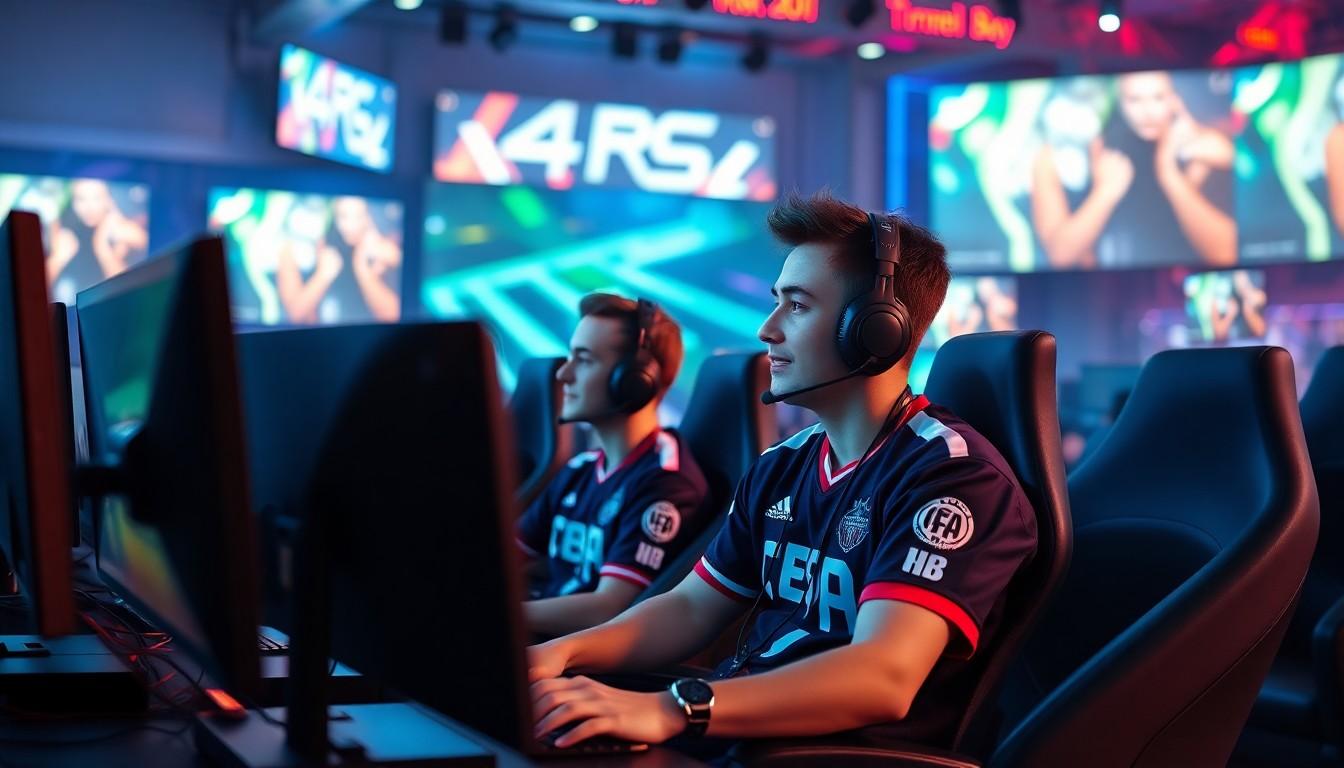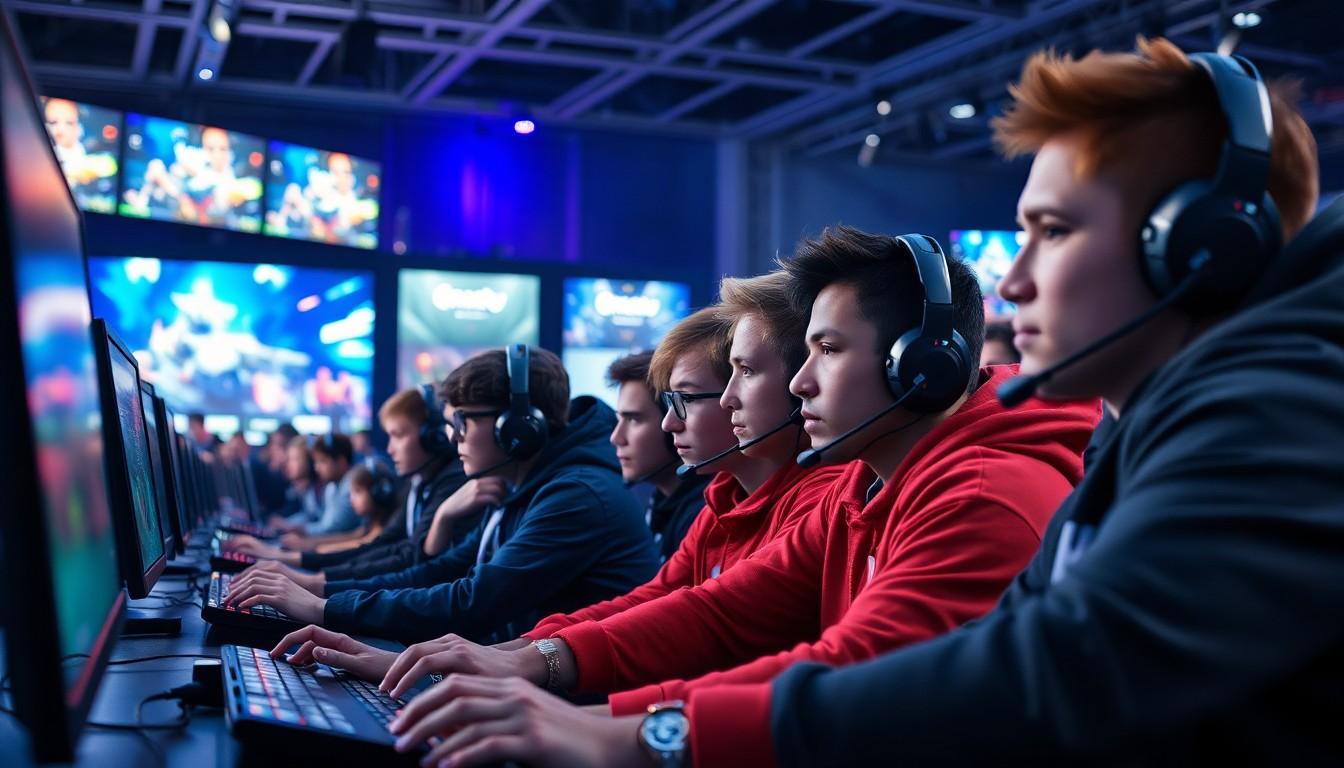Phone:
(701)814-6992
Physical address:
6296 Donnelly Plaza
Ratkeville, Bahamas.

In the fast-paced world of esports, pro gaming teams are the rock stars of the digital arena. These elite squads don’t just play video games; they redefine what it means to compete. With strategic minds and lightning-fast reflexes, they turn virtual battles into thrilling spectacles that captivate millions.
Pro gaming teams represent the pinnacle of competitive gaming, showcasing elite players adept at strategic gameplay. Teams often assemble based on skill, teamwork, and a shared vision for success. Players commit to rigorous training regimens, spanning hours daily, honing their skills across various titles in the esports landscape.
Significant tournaments attract massive viewership, with events like The International and the League of Legends World Championship drawing millions of fans. High-stakes competitions generate substantial prize pools, often exceeding $30 million. Organizations invest in sponsorships, equipment, and training facilities to provide players with optimal resources.
Support roles accompany professional players, including coaches, analysts, and managers, who contribute strategically behind the scenes. Coaches develop game strategies and analyze opponents’ tactics, enhancing team performance. Analysts offer data-driven insights based on gameplay statistics and past matches.
Notable teams like Team Liquid and Fnatic consistently perform at top-tier levels, cementing their legacies within the esports community. Branding plays a crucial role, with logos and merchandise helping teams connect with fans. Engaging social media presence allows teams to cultivate a dedicated fan base, driving support during matches.
The commitment to innovation also defines professional gaming teams. They explore new technologies and strategies to elevate their game. Adaptation to game updates is essential; teams quickly learn and integrate changes to maintain competitiveness. By continually evolving, these teams uphold their status as champions of the digital arena while captivating audiences worldwide.

Pro gaming teams have a rich history that reflects the evolution of competitive gaming into a global phenomenon. Notably, the early days of esports showcased small tournaments and local competitions that paved the way for larger events.
Esports began in the 1970s with simple games and local competitions. Players engaged in friendly matches, laying the groundwork for future development. The 1990s heralded significant growth, as LAN parties became popular and marked the rise of competitive gaming culture. Games like Doom and StarCraft captured audiences and encouraged organized tournaments. By the 2000s, online play flourished, and events such as the Cyberathlete Professional League emerged, attracting larger audiences. The introduction of streaming platforms like Twitch enabled fans to watch their favorite teams live, boosting engagement and participation. Throughout this evolution, pro gaming teams became essential, representing their communities and enhancing the competitive landscape.
Several key events shaped the history of pro gaming teams. The inaugural esports tournament, the 1980 Space Invaders Championship, drew over 10,000 participants and highlighted the potential for competitive gaming. The early 2000s saw the formation of professional organizations, including SK Gaming and Team 3D, which set standards in team structure and branding. Acclaimed tournaments, like the World Cyber Games in 2000 and the Electronic Sports World Cup in 2003, attracted media attention and established esports on a global stage. In 2011, the first International Dota 2 Championship featured a record-breaking prize pool of $1 million, representing a shift in financial investment in esports. The emergence of these landmark moments solidified pro gaming teams as vital players in the growing industry.
Pro gaming teams operate with a structured hierarchy that enhances their competitive edge. Understanding team composition and the roles within these teams clarifies their operation.
Five to six players typically form the core of a professional gaming team, ensuring a blend of skills vital for success. Each player specializes in specific gameplay aspects, contributing to a well-rounded strategy. In many cases, teams also include substitutes who step in during tournaments or practice sessions. This setup allows teams to maintain gameplay consistency, even under pressure. Organizations regularly invest in scouting talent to discover players who exhibit both mechanical skill and strategic thinking, vital for adaptation to various game meta.
Specific roles define how players contribute to their team’s success in competitive gaming. Carry or damage-dealer positions focus on inflicting maximum damage, while support roles emphasize aiding teammates through healing or buffs. Additionally, team captains preside over strategic decisions and in-game leadership. Coaches play a crucial role outside of gameplay, providing analysis and training to improve performance. Analysts collect and dissect match data, identifying strengths and weaknesses in opponents. Each role functions synergistically, supporting the overall aim of winning tournaments and enhancing team synergy.
Pro gaming teams shape the competitive landscape of esports. Their influence resonates through various games and tournaments worldwide.
Team Liquid stands as one of the most prestigious organizations in esports. Founded in 2000, this team has achieved notable success in games like Dota 2, League of Legends, and CS:GO. With a history rich in championship titles, they consistently emphasize skill development and teamwork. Their player roster features top-tier talent, showcasing relentless determination and discipline. Team Liquid’s commitment extends beyond gameplay, as they build a strong fan base through engaging content and community interaction.
Cloud9 emerged as a powerhouse in the esports realm. Established in 2013, the organization quickly garnered attention with success in games like League of Legends and Valorant. Cloud9 balances a competitive spirit with a vibrant culture that encourages player growth. Diverse strategies fuel their gameplay, integrating analytical approaches and in-game adaptability. Their players not only compete at high levels but also interact with fans, creating a loyal following that enhances their brand.
Fnatic commands respect in the competitive gaming arena. Founded in 2004, this team is synonymous with excellence in titles like League of Legends, CS:GO, and Rainbow Six Siege. Their legacy features a multitude of championships, showcasing their unparalleled dedication to success. Fnatic invests heavily in player development and innovative training methods to stay ahead in the competitive landscape. The organization maintains a robust connection with fans through social media engagement and merchandise that embodies their vibrant identity.
Pro gaming teams significantly influence the esports landscape, driving revenue and fostering community engagement.
Pro gaming teams generate substantial revenue through various avenues. Sponsorship deals often contribute major funding, with brands eager to reach the engaged esports audience. Merchandise sales, including team jerseys and gaming peripherals, enhance income streams further. Major tournaments present lucrative prize pools, sometimes exceeding $30 million, which attract top talent and viewership. Streaming platforms provide additional revenue through advertisements and subscriptions, increasing a team’s financial stability. For instance, organizations like Team Liquid and Fnatic secure millions in sponsorship deals, allowing for better training resources and player support.
Community engagement serves as a cornerstone for pro gaming teams. Fans connect with teams via social media platforms, leading to a dedicated following. Team events, such as meet-and-greets and fan tournaments, promote interactions and build loyalty. Streamed gameplay allows fans to watch their favorite players in action, creating a sense of inclusion. Organizations often invest in community outreach initiatives, supporting local gaming events and charities. Noteworthy teams, including Cloud9, emphasize engaging with fans regularly, fostering an environment where supporters feel like part of the team.
Pro gaming teams are at the forefront of the esports revolution. Their dedication to excellence and innovation not only elevates competition but also captivates audiences around the globe. With a structured approach to team dynamics and a commitment to player development, these organizations set the standard in the industry.
As they continue to engage fans through social media and community initiatives, pro gaming teams strengthen their presence and influence. The impact of these teams on the esports landscape is undeniable, driving revenue and fostering a vibrant community. As the industry evolves, their role will only grow, solidifying their status as champions of the digital arena.